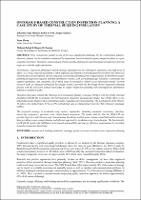Chapter Ontology-Based Construction Inspection Planning: A Case Study of Thermal Building Insulation
| dc.contributor.author | Boden, Markus | |
| dc.contributor.author | Thibaut, Delval | |
| dc.contributor.author | El Chamaa, Rayan | |
| dc.contributor.author | Seiß, Sebastian | |
| dc.contributor.author | Melzner, Jürgen | |
| dc.contributor.author | Zheng, Yuan | |
| dc.date.accessioned | 2024-04-02T15:44:50Z | |
| dc.date.available | 2024-04-02T15:44:50Z | |
| dc.date.issued | 2023 | |
| dc.identifier | ONIX_20240402_9791221502893_19 | |
| dc.identifier.issn | 2704-5846 | |
| dc.identifier.uri | https://library.oapen.org/handle/20.500.12657/89050 | |
| dc.description.abstract | Poor construction quality is one of the most significant challenges for the construction industry. However, failures can be avoided or minimized by inspections based on detailed quality inspection plans as a part of quality assurance. Therefore, structured and project-specific planning of inspection plans is required to provide inspectors with the right information. Nevertheless, inspection planning is mainly manual, dependent on the individual’s experience and high level of effort. As a result, inspection planning is often neglected and limited to providing general checklists that often lack semantically rich descriptions and are unspecific concerning individual project requirements. Furthermore, proper planning of inspections requires multiple information sources, such as building design, schedules, contractual and supplier guidelines, and standards, all of which must be provided or linked via an information model. Current research lacks an adequate formalized knowledge model to provide the knowledge-driven inspection planning process with the necessary domain knowledge to support inspection planning with heterogeneous information defined in isolated systems. Therefore, this paper extends the Ontology for Construction Quality Assurance (OCQA) with the OCQA-Thermal Insulation (OCQA-TI) to formalize thermal insulation inspection planning knowledge. The OCQA offers a new linked data model that provides explicit knowledge of quality inspection planning. The development of the OCQA-TI follows the Linked Open Terms (LOT) methodology and is implemented using the Web Ontology Language (OWL). The proposed ontology is evaluated using various approaches, including automatic consistency checking, answering competency questions, and criteria-based evaluation. The results indicate that the OCQA-TI can provide inspectors with relevant inspection planning knowledge and integrate various related information streams, thus providing a more comprehensive and efficient approach to insulation inspection planning. The functionality of OCQA-TI enables the fulfillment of increased sustainability and energy efficiency requirements by providing insulation inspection knowledge | |
| dc.language | English | |
| dc.relation.ispartofseries | Proceedings e report | |
| dc.subject.classification | thema EDItEUR::U Computing and Information Technology | |
| dc.subject.other | semantic web | |
| dc.subject.other | building insulation | |
| dc.subject.other | ontology | |
| dc.subject.other | quality assurance in construction | |
| dc.subject.other | inspection planning | |
| dc.title | Chapter Ontology-Based Construction Inspection Planning: A Case Study of Thermal Building Insulation | |
| dc.type | chapter | |
| oapen.identifier.doi | 10.36253/979-12-215-0289-3.82 | |
| oapen.relation.isPublishedBy | bf65d21a-78e5-4ba2-983a-dbfa90962870 | |
| oapen.relation.isbn | 9791221502893 | |
| oapen.series.number | 137 | |
| oapen.pages | 13 | |
| oapen.place.publication | Florence |

